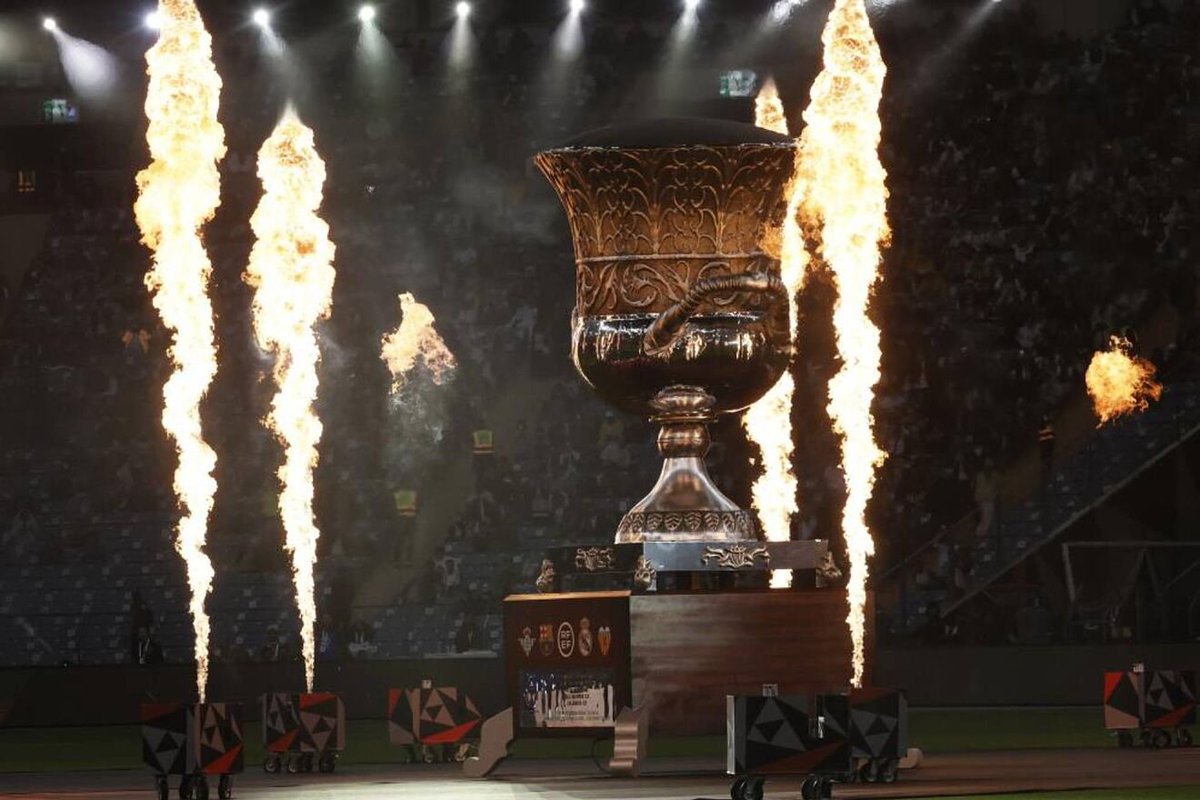
F.C Barcelona - Real Madrid: Winners of the Spanish Super Cup, Xavismo continued.
[THREAD]
#JdPExplains
[THREAD]
#JdPExplains

A primordial game, though insignificant on paper. The Spanish Super Cup used to be a final game between the league & Copa Del Rey winners, but the format recently has changed. After Valencia and Betis were booted out by the archrivals, here they were to meet again.
A Clásico.
A Clásico.
This is mentioned not out of pride, but out of necessity. A Clásico will always be of epic proportions, no matter how one tries to minimize its impact, even when it is in Saudi Arabia following Rubiales' great aspirations.
It's a potential turning point in Xavismo, first trophy.
It's a potential turning point in Xavismo, first trophy.
Without surprise, Xavi's dynamics set up a four-man box in the advanced midfield, composed of FdJ + Gavi (interiors) and Pedri(false winger) & Lewandowski.
This central occupation ensured overloads in the midfield, accompanied by two wingers (Dembélé + Baldé) to occupy wide.
This central occupation ensured overloads in the midfield, accompanied by two wingers (Dembélé + Baldé) to occupy wide.

This already forced Real Madrid in uncomfortable choices, such as how to deal with Baldé's advantage in 1v1 duels, but also how to press compactly in the midfield while avoiding 1v1's wide? Pedri's movements along Gavi's off the ball were essential, leaving Busquets with time.
Real Madrid at first tried dealing with this by pressing higher, hoping to suffocate Barcelona in the first line when building up from the back.
If both Koundé and Christensen could not be reached, the interiors would slide down to receive the ball (and the wide zones opens up).
If both Koundé and Christensen could not be reached, the interiors would slide down to receive the ball (and the wide zones opens up).

Real Madrid often tried to overload zones wide, specifically by the aid of Modrić, but a lack of distraction meant Barceloona always found the numerical superiority when defending, therefore nullifying the threat. It also explains the lack of general threat from Madrid. 

This also resulted in Barcelona finding advantage easily after dispossessing their opponents: Barcelona players were in proximity and decision-making seemed easy, intuitive. Real Madrid, however, never knew who to press due to the numerical superiority advantage. 

As mentioned by @ThePurist_ in @BarcaSpaces 's Space yesterday, the left-wing is mostly combinative play. Pedri regularly pulled his defender higher to allow Baldé to project himself wide, a 1v1 that was winning, provoking therefore chaos.
Real Madrid lost the game of space.
Real Madrid lost the game of space.

Another source of Barcelona's dispossessions was a high-press, which left Real Madrid stranded in a beach of tsunami waves. As such, Barcelona didn't overcommit but made sure to limit options, therefore gaining possession more and more. A confidence growth. 

The said situations became chaotic for Real Madrid, who did not find any counter-press to provoke counter-play, nor a viable compact structure to deny Barcelona progression. As seen below, Balde's acceleration as well as Pedri's decision-making leaves Madrid in inferiority. 

Re: Real Madrid find the exit, but Barcelona don't need to run much (attack = defense), and as such, quickly stabilize and stagnate, eventually nullify Real Madrid's threat.
This is the type of defence that provides the much-needed confidence. Up to Barcelona to control.
This is the type of defence that provides the much-needed confidence. Up to Barcelona to control.

Xavi's box four meant that attacking the blindspot was natural and pinned full-backs at easy, as seen here with the interior attacking space behind the FB & CB, therefore leaving wide space + time to be exploited. This is precisely why the Gavi/Pedri combination is this goood. 



As Baldé won his 1v1's, it soon enough became a 1v2 that meant a freed man on Barcelona's side. And though his crossing can still improve, Baldé showed he's so much more than just acceleration and 1v1's, finding his teammates regularly. Made for Barcelona. 



Lewandowski's movements on and off the ball also played an important part in confusing Real Madrid's block. Lewandowski often arrived in the left-halfspace to combine and free himself, passing on to the next players. What should Rea Madrid do now? 

Eventually, this would lead to situations like these, where one of the box four interiors would drop deep to receive the ball, which the other would run and cut diagonally to receive higher up with a vertical pass.
A razor blade in the middle of Madrid's defence.
A razor blade in the middle of Madrid's defence.

Real Madrid reacted by intending to use Modrić + Benzema as lane openers, in the hope that Camavinga/Vinicius Jr could run in behind. However, with the central (and most important) space occupied, this rarely caused fear for Barcelona's defense. 

As Busquets progressed higher with Christensen finding more and more ball possession, the left wing/half-space was suddenly overloaded, and that with Busquets remaining unmarked (letting him release the killer pass whenever he wanted, w/ combinative on + off the ball play). 

Should Real Madrid focus on preventing that killer pass, Koundé's ball-playing abilities and confidence as a centre-back projected him as a holding midfielder. Dembélé would therefore cut inside to receive the pass, with plenty of options despite being encircled by Madrid. 

Something I'd like Barcelona to try more is Frenkie's rare dagger-type of pass. Though intercepted, the intention is definitely possible + the execution. Baldé runs in behind, unmarked as Madrid still focus on the right-wing threat. This type of play could benefit Barcelona. 

Here's a final example that concludes the threat as to Why Koundé genuinely might fit Barcelona more as a centre-back than right-back. His pass & cut tendency is second tonnone, specifically with this athleticism. Can be a game changer offensively.
End of thread.
End of thread.

• • •
Missing some Tweet in this thread? You can try to
force a refresh





